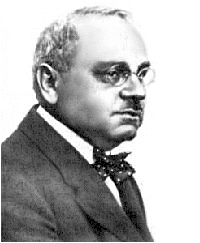
Back ألفرد أدلر Arabic ادلر ARZ Alfred Adler AST Alfred Adler Azerbaijani آلفرد آدلر AZB Альфрэд Адлер Byelorussian Алфред Адлер Bulgarian আলফ্রেড এ্যাডলার Bengali/Bangla Alfred Adler BS Alfred Adler Catalan
Alfred Adler | |
|---|---|
 | |
| Born | 7 February 1870 |
| Died | 28 May 1937 (aged 67) Aberdeen, Scotland |
| Nationality | Austrian |
| Alma mater | University of Vienna |
| Known for | Individual psychology Belonging Gemeinschaftsgefühl Social interest Birth order Inferiority complex Style of life |
| Spouse | Raissa Epstein |
| Children | Alexandra Adler, Kurt Alfred Adler, Valentine Adler, Cornelia Adler |
| Scientific career | |
| Fields | Psychotherapist, psychiatrist |
| Part of a series of articles on |
| Psychoanalysis |
|---|
 |
Alfred Adler (/ˈædlər/ AD-lər;[1] German: [ˈalfʁeːt ˈʔaːdlɐ]; 7 February 1870 – 28 May 1937) was an Austrian medical doctor, psychotherapist, and founder of the school of individual psychology.[2] His emphasis on the importance of feelings of belonging, relationships within the family, and birth order set him apart from Freud and others in their common circle. He proposed that contributing to others (social interest or Gemeinschaftsgefühl) was how the individual feels a sense of worth and belonging in the family and society. His earlier work focused on inferiority,[3] coining the term inferiority complex, an isolating element which he argued plays a key role in personality development.[4] Alfred Adler considered a human being as an individual whole, and therefore he called his school of psychology "individual psychology".
Adler was the first to emphasize the importance of the social element in the re-adjustment process of the individual and to carry psychiatry into the community.[5] A Review of General Psychology survey, published in 2002, ranked Adler as the 67th most eminent psychologist of the 20th century.[6]
- ^ "Definition of Adler | Dictionary.com". www.dictionary.com. Retrieved 2022-06-24.
- ^ Hoffman, E. (1994). The Drive for Self: Alfred Adler and the Founding of Individual Psychology. Reading, MA: Addison-Wesley. pp. 41–91. ISBN 978-0-201-63280-4.
- ^ Alfred Adler, Understanding Human Nature (1992) Chapter 6
- ^ Carlson, Neil R. (2010). Psychology the science of behaviour.
- ^ "my.access — University of Toronto Libraries Portal". Retrieved 2 October 2014.
- ^ Haggbloom, Steven J.; Warnick, Renee; Warnick, Jason E.; Jones, Vinessa K.; Yarbrough, Gary L.; Russell, Tenea M.; Borecky, Chris M.; McGahhey, Reagan; et al. (2002). "The 100 most eminent psychologists of the 20th century". Review of General Psychology. 6 (2): 139–152. CiteSeerX 10.1.1.586.1913. doi:10.1037/1089-2680.6.2.139. S2CID 145668721.